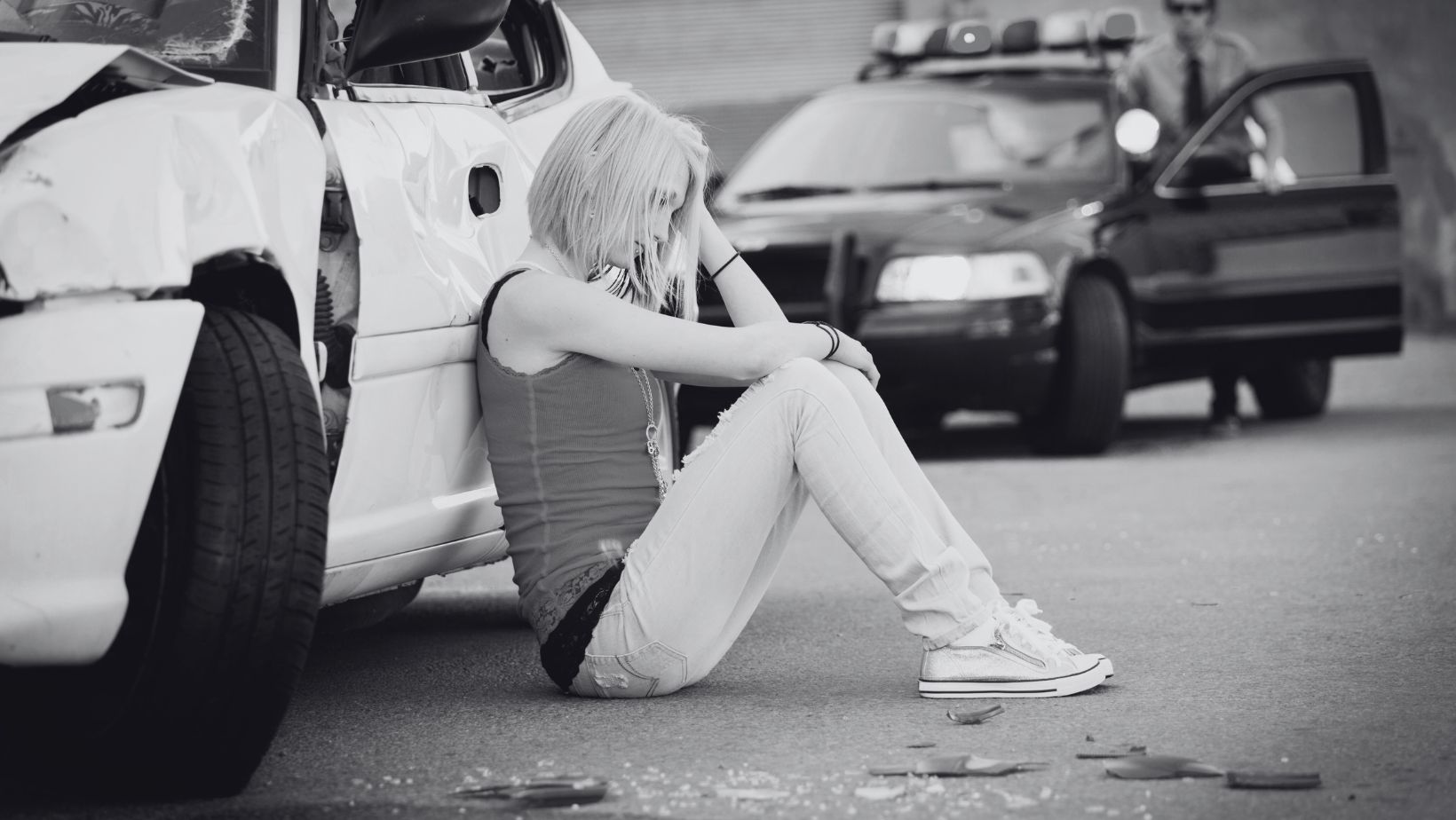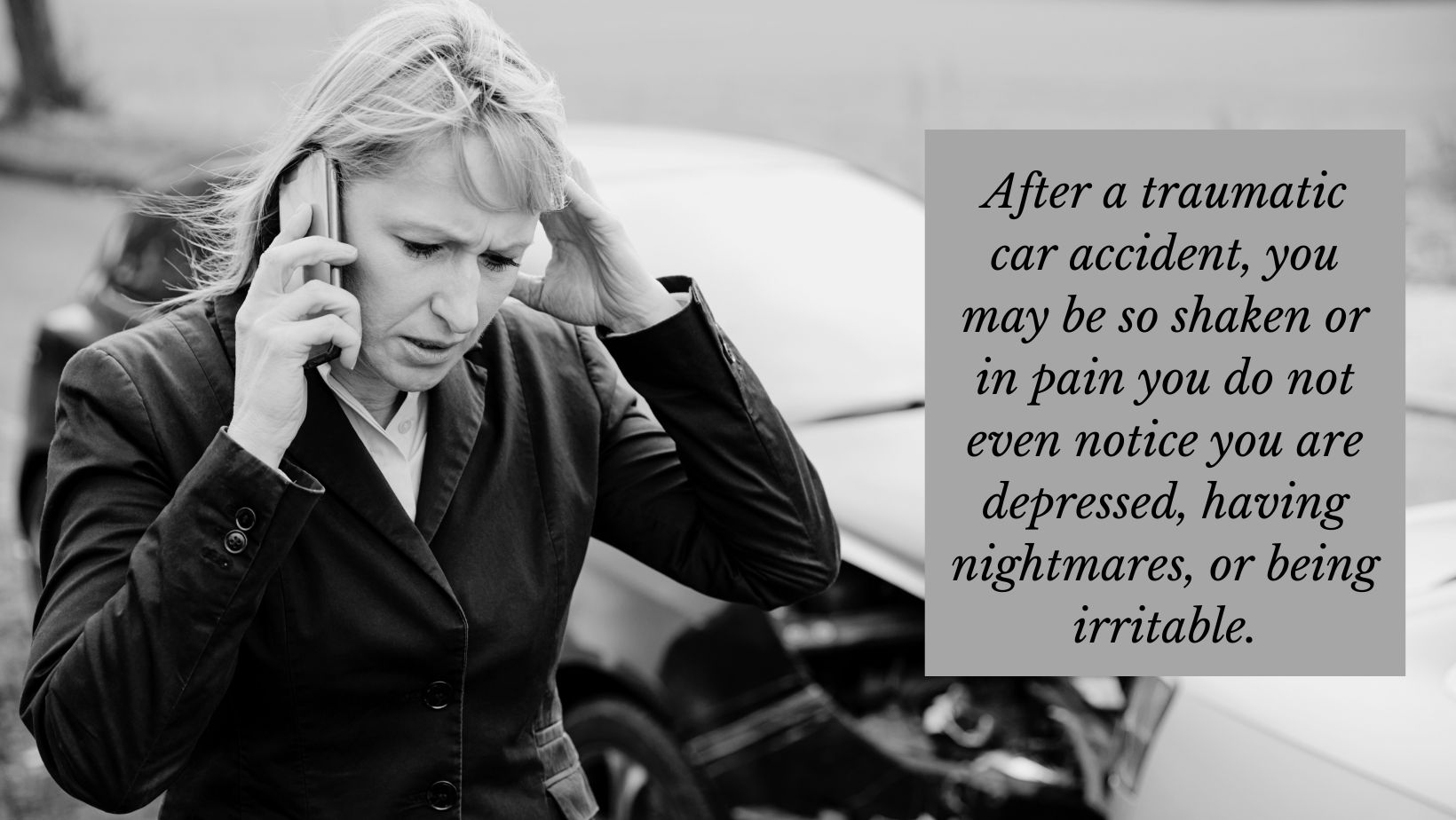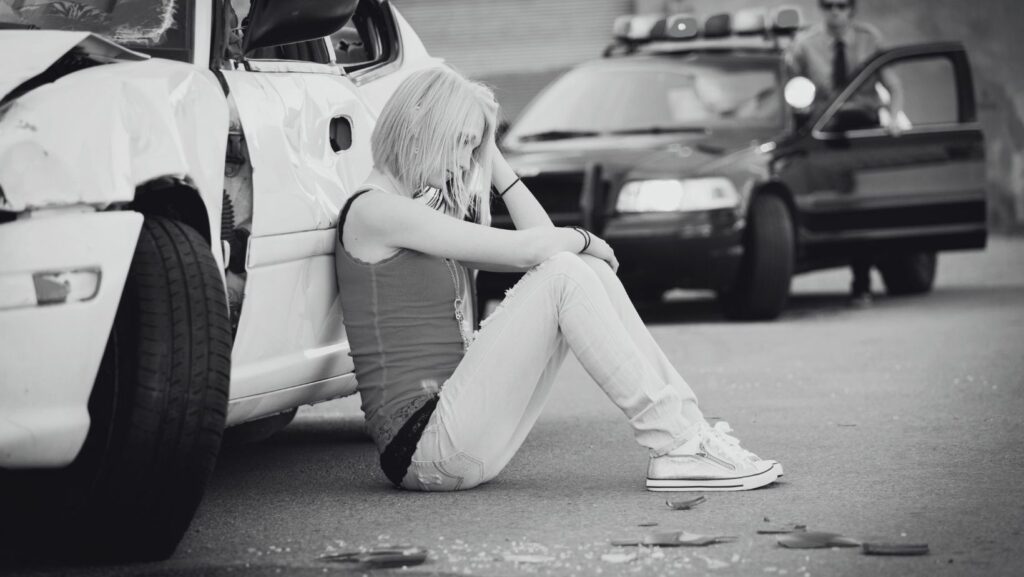Trauma after a car accident can make you miserable for years. You may have nightmares, flashbacks, insomnia, or fear of driving a car. You are not alone. Within one month of a serious car accident, an estimated 25% to 33% of people in crashes suffer from post-traumatic stress disorder—PTSD. More than 7% struggle with PTSD for the rest of their lives.
 Image by Rich Legg by Canva.com
Image by Rich Legg by Canva.com
If you have been in a serious accident, it is a good idea to be aware of the symptoms of PTSD. Knowing if you have it will affect how quickly you heal emotionally, and information about your mental health challenges can be a great relief as you deal with the economic challenges ahead.
The Connection Between Trauma After a Car Accident and PTSD
When you suffer from trauma after a car accident, everything seems harder. You can’t sleep. Instead of being your usual patient self, you are snapping at your spouse, kids, and coworkers. You keep forgetting things ranging from where you put your keys to a promise you made to a friend. And you are not interested in going anywhere, especially to work. These are all symptoms of PTSD, a mental health condition suffered by people who have experienced or seen a terrifying or traumatic event—especially one in which someone was seriously hurt or could have been.
Symptoms of PTSD
Think about your mindset, actions, and reactions since your trauma after a car accident. Do they fall into one of these four categories of PTSD symptoms?
- Reliving: PTSD sufferers may relive the trauma of a car wreck in flashbacks, nightmares, night terrors, and hallucinations. Some people scream in their sleep while reliving the accident. Nightmares may ruin your sleep while flashbacks wreck your waking hours.
- Avoiding: When you have PTSD, you may do everything you can to avoid thinking about the wreck. You avoid driving by where the accident happened. You stay away from people who remind you of the wreck and stop doing things that remind you of it. For example, if you got in the wreck on the way home from bowling, you stop bowling. Before long, you feel isolated and lonely.
- Increased arousal: People with PTSD struggle to control their emotions. They may be aggressive and yell at people when they are angry. They may be irritable, have trouble with relationships, and startle easily. Trouble falling or staying asleep are also symptoms of PTSD. You also may have physical symptoms including high blood pressure, muscle tension, rapid breathing, diarrhea, or nausea.
- Negative thoughts and mood: Does your mood quickly change from calm to angry? Do you blame others for how the wreck affected you? These are symptoms of PTSD. Negative thoughts also may lead to intense fear of driving, riding in cars, or being in crowds. Some people with PTSD suffer from suicidal thoughts.
If you are suffering from any of these symptoms, we urge you to visit your doctor as soon as possible. They may give you medications to help you feel better. You also may receive help from counseling.
If you are having thoughts of suicide, please call or text the free 988 Suicide & Crisis Hotline. Trained counselors are available 24 hours a day, seven days a week.
Who is Most Likely to Get PTSD
Once, medical professionals thought veterans were the only ones who contracted PTSD. Now we know many victims of trauma suffer from PTSD as well. In addition to military combat, major causes of PTSD include car crashes, losing a loved one, being in a natural disaster, and surviving sexual or physical assault. Many first responders and families of accident victims also suffer from PTSD.
Psychiatrists do not fully understand why some people develop PTSD and others in the same situation do not. They do know that car crash victims with one or more of these risk factors are more likely to develop PTSD:
- Being female.
- Earlier experiences with trauma.
- The death of another person in the vehicle.
- Coming close to dying in the accident.
- Severe pain from your injuries in the wreck.
- Personal or family history of mental illness.
- No support system.
If you have these risk factors, symptoms of PTSD, and serious injuries, please see a doctor. Getting help for your mental health does more than treat your state of mind; improvements in mental health have a major influence on how quickly you recover from your injuries, too. Your decision to be treated for PTSD, major depression, or anxiety also will have a long-term impact on your quality of life.
How Long PTSD Lasts
After a traumatic car accident, you may be so shaken or in pain you do not even notice you are depressed, having nightmares, or being irritable. Some people have these symptoms and other symptoms of PTSD right after a wreck. However, most crash victims who suffer from PTSD notice symptoms within three months of the accident. For others, struggles with PTSD begin years later.
Risk factors for PTSD affect both the severity and length of the illness. Some feel better within six months and others suffer with PTSD for years. Sometimes, a crash victim has PTSD for the rest of their life.
 Image by Monkey Business by Canva.com
Image by Monkey Business by Canva.com
How to Heal from PTSD
You may not be able to prevent PTSD after a traumatic accident, but you can make it more bearable and not last so long. Taking care of your mind and body are key to healing from the illness:
- Talk about your feelings to a close friend or counselor.
- Avoid making any big decisions after a trauma.
- Calm your mind and body with yoga, meditation, and being outdoors.
- Avoid drugs and alcohol.
- Avoid risky or dangerous activities.
When you take it easy and get support, you may avoid years of suffering from PTSD. Remember, many people suffering from PTSD after a wreck feel better within six months. Others suffer for much longer.
Where to Get Help When PTSD Wrecks Your Finances
If you are the victim of an auto accident where another driver was at fault, you may be able to receive compensation for your expenses after the crash—including expenses having to do with the diagnosis and treatment of PTSD. Kane Personal Injury helps people like you reach a settlement to compensate for the injuries and trauma received, as far as New Mexico law will allow. We start with three questions:
- Did the other driver’s careless driving cause the accident?
- Are you suffering from PTSD because of the accident?
- Does your PTSD affect your financial situation?
Based on what you tell us, we decide if you have a good case for collecting money from the other driver’s insurance company. Typical settlements from insurance include money for doctor’s visits and therapy, lost wages, pain and suffering, and emotional distress.
You do not need to go after the other driver yourself. The lawyers at Kane Personal Injury will do all the paperwork and negotiate with the other driver’s insurance company. Our goal is getting you the money you need to live without stress while you heal. Contact us today online or at 575-449-3673. Your first meeting with us is free of charge.
Please note that this article was created for advertisement purposes, and it does not constitute any contractual legal relationship, nor imply one.
